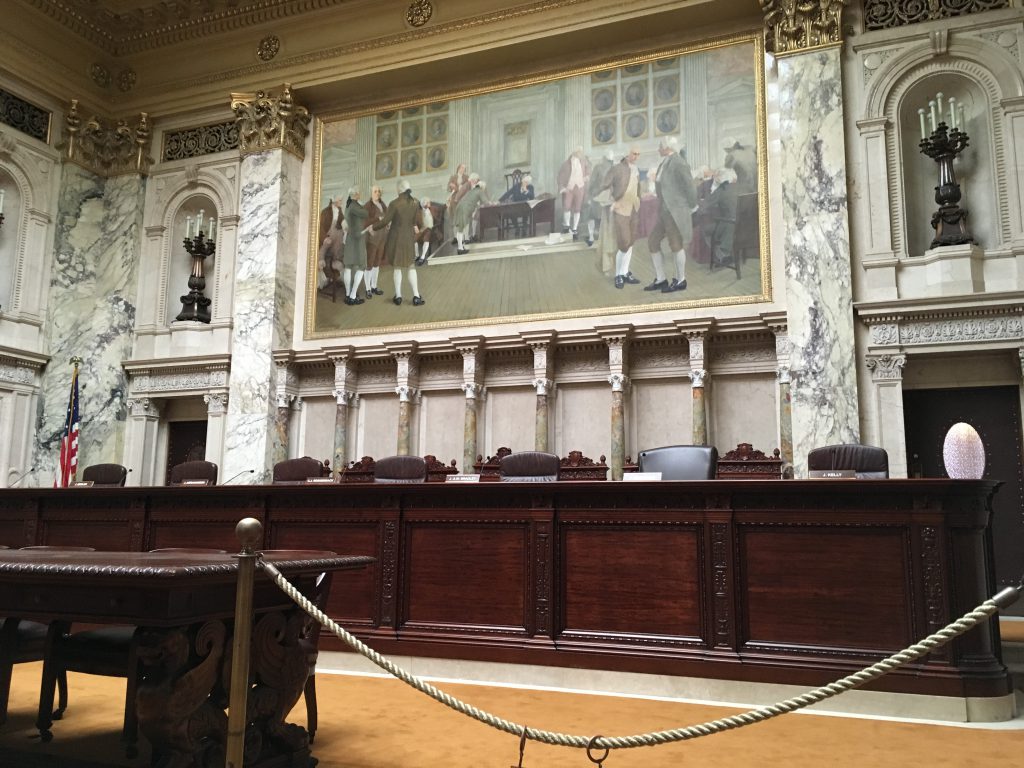How Governor’s Power Was Weakened
Recent high court decision latest of several rulings reducing governor's power.
Whoever is elected governor on Nov. 8 — Democrat Tony Evers or a Republican — will inherit an office significantly weakened by the Republican-controlled Legislature and state Supreme Court rulings.
The next governor will find the biggest powers left are the veto — of individual bills or line-item vetoes of spending bills passed by the Legislature — appointment powers, and face-of-Wisconsin public role as chief executive.
The latest restriction on the Office of the Governor came last week. A split Supreme Court ruled that a member of the Natural Resources Board, Frederick Prehn, who was appointed to a six-year term by Republican Gov. Scott Walker in 2015, can remain on the board until the Republican-controlled Wisconsin Senate confirms the appointee Evers wants, Sandra Naas, to replace Prehn.
Republican senators have refused to confirm Naas. They have also hobbled Evers by not confirming his appointees who run the departments of Administration, Health Services, Workforce Development and Financial Institutions.
Evers was in office less than a year when Republican senators fired one appointee, State Sen. Brad Pfaff, then secretary of the state Department of Agriculture, Trade and Consumer Protection.
Before the Prehn ruling, two other developments reigned in governors’ powers. In December 2018, weeks after Evers defeated Walker, the outgoing governor signed “lame duck” bills passed by Republican legislators that put new limits on the powers of governors. They required legislative approval of changes in public benefits, required governors to rework government documents and websites, and let lawmakers more easily block rules written by the Evers administration and intervene in lawsuits challenging state laws.
And in March 2021, the Wisconsin Supreme Court ruled that governors cannot issue successive emergency declarations without approval of the Legislature. For a year, Evers had declared ongoing emergencies to fight the Covid pandemic. Instead, the court ruled that any governor-declared emergency can only last for 60 days, unless the Legislature extends it. Evers criticized the court’s ruling, saying negotiating with Republican legislators on issues like when and where face masks must be worn would take too long and not succeed.
The Prehn decision was the third blow to powers of Wisconsin governors. “The expiration of Prehn’s term on the DNR Board does not create a vacancy,” Chief Justice Annette Ziegler wrote for the four-justices majority. “Prehn lawfully retains his position on the DNR Board as a holdover. Therefore, the Governor cannot make a provisional appointment to replace Prehn,” she added. “Until his successor is nominated by the governor and confirmed by the Senate, Prehn may be removed by the Governor only for cause.”
Writing for dissenters, Justice Rebecca Dallet called that logic “absurd.”
It “allows Prehn’s six-year term on the Board of Natural Resources – which expired over a year ago – to last for as long as Prehn wants it to, so long as he refuses to leave and the Senate doesn’t confirm a successor nominated by the governor,” Dallet said. “The majority …. steers our state’s government directly into disorder and chaos, threatening the fragile separation of powers central to its functions.”
Democratic Atty. Gen. Josh Kaul called it a dangerous precedent. “Almost 31/2 years into [Evers] term, the Natural Resources Board remains controlled by Walker appointees,” Kaul said. “This decision allows that anti-democratic situation to continue indefinitely – taking power away from Wisconsin voters, and instead leaving it to the whims of appointees of an administration that was voted out of office.”
But Senate President Chris Kapenga said the decision continues state government’s “strong commitment to checks and balances.”
The irony in the Prehn decision is that in 1995, the Legislature gave governors more power by letting them directly appoint secretaries of the Natural Resources and Agriculture, Trade and Consumer Protection departments.
Now, although governors can name those running the agencies, the policy goals of those governors can be blocked or delayed by appointees of the political opponents those same governors defeated.
All this means future governors — whatever their party — won’t be as powerful as their predecessors.
Steven Walters started covering the Capitol in 1988. Contact him at stevenscotwalters@gmail.com
The State of Politics
-
RNC Brings Fame to Gen Z Party Leader
 Jul 15th, 2024 by Steven Walters
Jul 15th, 2024 by Steven Walters
-
Wisconsin’s Republican Roots Run Deep
 Jul 8th, 2024 by Steven Walters
Jul 8th, 2024 by Steven Walters
-
Feuding Supreme Court Justices Need a Break
 Jul 1st, 2024 by Steven Walters
Jul 1st, 2024 by Steven Walters























Both the Federal and State Supreme Court are intentionally fabricating their own legal reason which undermines the traditional separation of powers. It gives powers to a minority in a party while limiting the rights of the majority for good public policy. The checks and balances in our government are quickly being eroded into a belligerent minority doing the will of Wisconsin Manufacturers and Commerce and the billionaires promoting their own social, religious, and economic agenda.